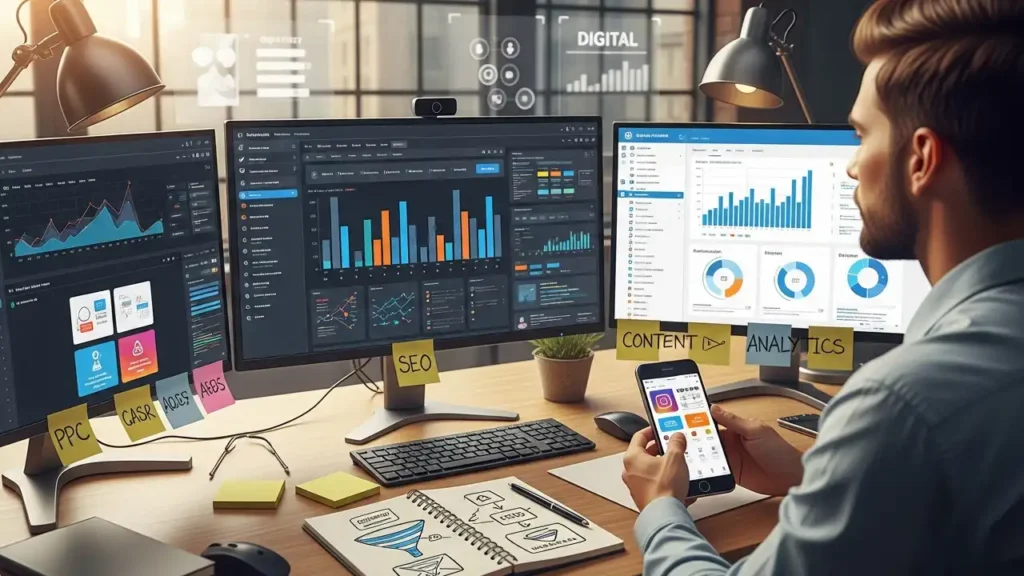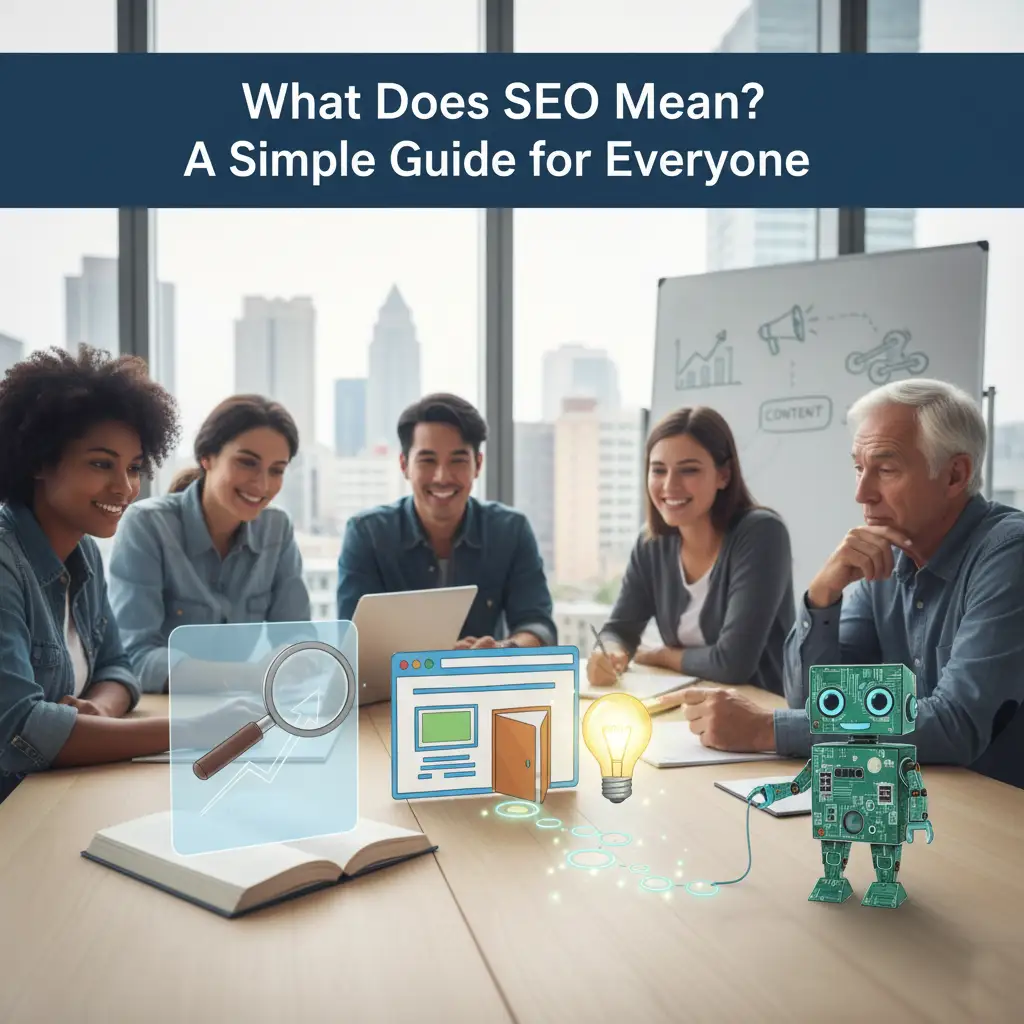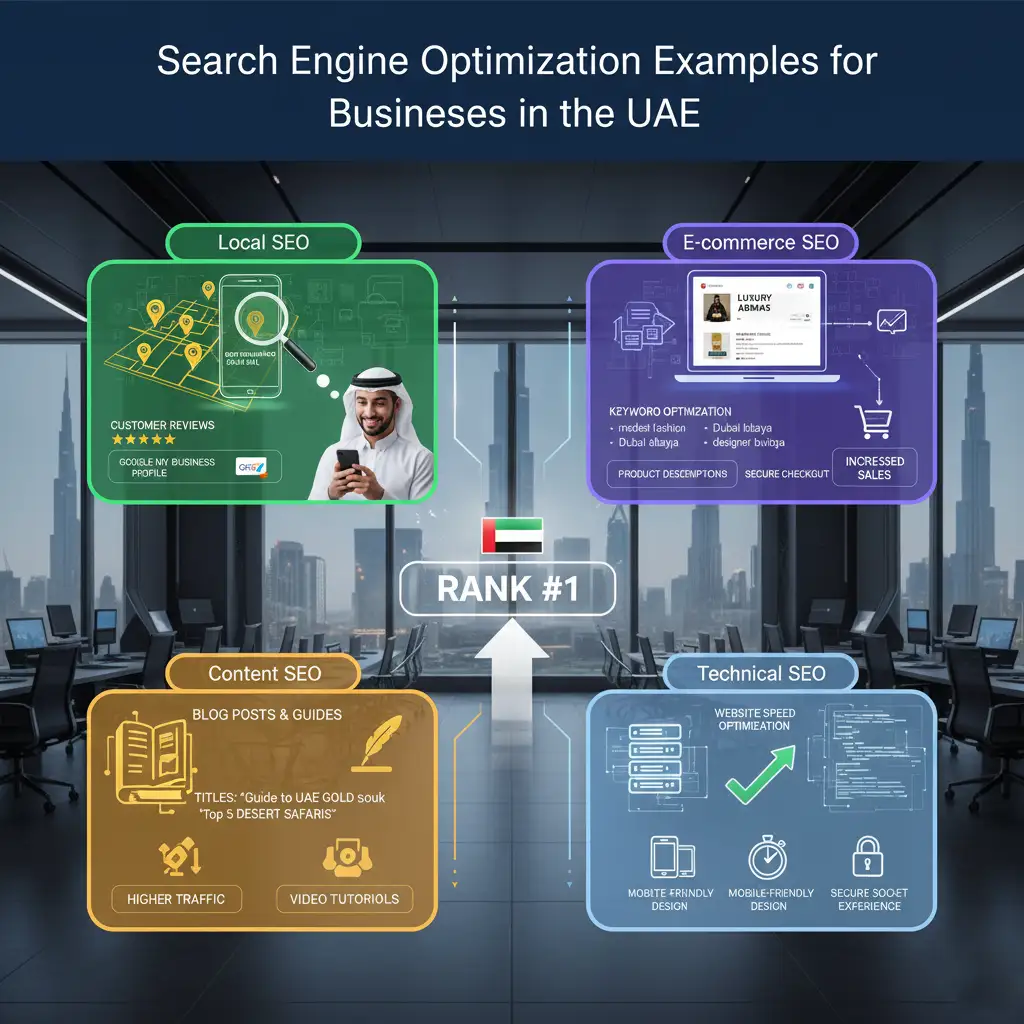How Digital Marketing Works: 2025 Guide to Winning
Digital marketing is the backbone of modern business. Whether you’re a small business owner or marketing professional, you need to stay up to date with the latest strategies and trends to stay ahead in today’s fast paced online world.
This guide covers everything you need to know about digital marketing in 2025, from proven strategies to emerging trends that will shape the future of online marketing.
What is Digital Marketing and Why It Matters
Digital marketing is all marketing that uses electronic devices and the internet. This includes search engine optimization (SEO), social media marketing, email marketing, content marketing and paid advertising across digital channels.
The importance of digital marketing is growing as more and more consumers are online. As marketers we know how fast the pace of change can be, so it’s essential to stay up to date with the latest trends and strategies.
Key Benefits of Digital Marketing
Digital marketing offers several advantages over traditional marketing methods:
- Cost-effective: Digital campaigns often cost less than traditional advertising
- Measurable results: Track every click, conversion, and customer interaction
- Targeted reach: Connect with specific audiences based on demographics and interests
- Global accessibility: Reach customers anywhere in the world
- Real-time optimization: Adjust campaigns instantly based on performance data
Essential Digital Marketing Strategies for 2025
Search Engine Optimization (SEO)
SEO is one of the top digital marketing channels. Sorting the top-rated channels by those with Highest ROI shows that the top 4 are all organic, so organic search still delivers.
On-Page SEO Best Practices
On-page SEO in 2025 is all about clarity and context. You want your content to be clear for users, search engines and the AI systems that increasingly pull answers from your pages.
Focus on these key elements:
- Title tags: Include your target keyword in the first 60 characters
- Meta descriptions: Write click-worthy descriptions
- Header tags: Use H1, H2, H3 tags to structure your content
- Internal linking: Link to related pages for user experience and SEO
- Page speed: Make sure your website loads on all devices
Technical SEO Essentials
- Mobile-first indexing optimization
- Core Web Vitals improvement
- Schema markup implementation
- XML sitemap optimization
- SSL certificate installation
Content Marketing Strategy
Content marketing drives three times more leads than traditional marketing while costing 62% less. Creating valuable, relevant content helps establish your brand as an industry authority.
Types of High-Performing Content
- Blog posts: Educational articles that solve customer problems
- Video content: Tutorials, demos, and behind-the-scenes footage
- Infographics: Visual representations of data and processes
- Case studies: Real examples of customer success stories
- Podcasts: Audio content for busy audiences
Content Creation Tips
- Research your audience’s pain points and interests
- Use storytelling techniques to make content more engaging
- Include actionable advice that readers can implement immediately
- Optimize content for search engines without sacrificing readability
- Repurpose content across different formats and channels
Social Media Marketing
The stronger your brand is on social media, the more “authoritative” your brand will be on other platforms – including SEO. Think of social media as the new backlinks.
Platform-Specific Strategies
Facebook Marketing
- Focus on community building and customer service
- Use Facebook Groups to create engaged communities
- Leverage Facebook Ads for precise targeting
Instagram Marketing
- Post high-quality visual content consistently
- Use Instagram Stories and Reels for better engagement
- Partner with influencers in your industry
LinkedIn Marketing
- Share professional insights and industry news
- Build relationships with decision-makers
- Use LinkedIn for B2B lead generation
TikTok Marketing
- Create short, entertaining videos
- Jump on trending hashtags and challenges
- Focus on authentic, unpolished content
Learn more about social media best practices from Social Media Examiner.
Email Marketing
Email marketing continues to deliver one of the highest returns on investment, with an average ROI of $42 for every $1 spent.
Email Marketing Best Practices
- Segmentation: Divide your email list based on customer behavior and preferences
- Personalization: Use customer names and tailor content to their interests
- Mobile optimization: Ensure emails look great on mobile devices
- A/B testing: Test different subject lines, content, and send times
- Automation: Set up welcome series, abandoned cart emails, and re-engagement campaigns
Types of Marketing Emails
- Welcome emails for new subscribers
- Weekly newsletters with valuable content
- Promotional emails for sales and special offers
- Educational email courses
- Customer testimonials and case studies
Pay Per Click (PPC) Advertising
PPC advertising allows you to place ads in front of potential customers who are actively searching for your products or services.
Google Ads Strategy
- Keyword research: Find relevant keywords with good search volume and manageable competition
- Ad copy optimization: Write compelling headlines and descriptions
- Landing page alignment: Ensure your ads lead to relevant, optimized landing pages
- Bid management: Monitor and adjust bids based on performance
- Quality Score improvement: Focus on relevance and user experience
Social Media Advertising
- Facebook and Instagram Ads for visual products
- LinkedIn Ads for B2B services
- Twitter Ads for real-time engagement
- YouTube Ads for video content promotion
Digital Marketing Trends Shaping 2025
Artificial Intelligence and Machine Learning
AI and machine learning stand out as transformative forces. This is reshaping how businesses approach customer engagement and data analysis.
AI applications in digital marketing include:
- Chatbots: Provide 24/7 customer support and lead qualification
- Predictive analytics: Forecast customer behavior and campaign performance
- Content optimization: Automatically test and optimize content variations
- Personalization: Deliver customized experiences at scale
- Voice search optimization: Optimize content for voice-activated searches
Video Marketing Dominance
Optimizing video content and structuring text content for Featured Snippets will be essential for maximum visibility in 2025.
Video marketing trends include:
- Short-form videos on TikTok, Instagram Reels, and YouTube Shorts
- Live streaming for real-time audience engagement
- Interactive video experiences
- Video podcasts and webinars
- User-generated video content
Influencer Marketing Evolution
Creators that have an authentic voice will be a key way to reach audiences and establish trust with consumers in 2025.
The influencer marketing landscape is shifting toward:
- Micro and nano-influencers with higher engagement rates
- Long-term brand partnerships over one-off campaigns
- Authentic content that doesn’t feel overly promotional
- Performance-based influencer compensation
- Brand-creator collaboration tools
Privacy-First Marketing
With increasing privacy regulations and the phase-out of third-party cookies, marketers must adapt their strategies:
- First-party data collection: Build direct relationships with customers
- Consent management: Implement clear privacy policies and opt-in processes
- Contextual advertising: Target based on content rather than personal data
- Customer data platforms: Centralize and organize customer information
- Transparent communication: Be upfront about data collection and usage
Measuring Digital Marketing Success
Key Performance Indicators (KPIs)
Track these essential metrics to measure your digital marketing effectiveness:
Website Metrics
- Organic traffic growth
- Bounce rate and session duration
- Conversion rate by traffic source
- Page load speed
- Mobile usability scores
Social Media Metrics
- Engagement rate (likes, comments, shares)
- Follower growth rate
- Click-through rate from social posts
- Social media conversion rate
- Brand mention sentiment
Email Marketing Metrics
- Open rate and click-through rate
- List growth rate
- Unsubscribe rate
- Email conversion rate
- Revenue per email sent
Paid Advertising Metrics
- Cost per click (CPC)
- Click-through rate (CTR)
- Cost per acquisition (CPA)
- Return on ad spend (ROAS)
- Quality Score
Analytics Tools
Use these tools to track and analyze your digital marketing performance:
- Google Analytics 4: Comprehensive website and app analytics
- Google Search Console: SEO performance monitoring
- Facebook Analytics: Social media performance tracking
- SEMrush or Ahrefs: SEO and competitive analysis
- Mailchimp or ConvertKit: Email marketing analytics
- Hootsuite or Buffer: Social media management and reporting
Learn more about analytics from Google Analytics Academy.
Building Your Digital Marketing Strategy
Step 1: Define Your Goals
Set clear, measurable objectives for your digital marketing efforts:
- Increase website traffic by 50% in six months
- Generate 100 new leads per month through content marketing
- Improve email open rates to 25%
- Achieve a 4:1 return on ad spend
- Grow social media followers by 30% quarterly
Step 2: Know Your Audience
Create detailed buyer personas that include:
- Demographics (age, location, income)
- Psychographics (interests, values, lifestyle)
- Online behavior (preferred platforms, content types)
- Pain points and challenges
- Buying process and decision factors
Step 3: Choose Your Channels
Select digital marketing channels based on where your audience spends time and your business goals:
- B2B companies: Focus on LinkedIn, email marketing, and content marketing
- E-commerce brands: Prioritize Google Ads, Facebook/Instagram ads, and email marketing
- Local businesses: Emphasize Google My Business, local SEO, and Facebook marketing
- SaaS companies: Invest in content marketing, SEO, and LinkedIn advertising
Step 4: Create a Content Calendar
Plan your content in advance to ensure consistency and strategic alignment:
- Map content to different stages of the customer journey
- Balance promotional and educational content
- Plan seasonal and trending content opportunities
- Coordinate content across all marketing channels
- Include time for content optimization and updates
Step 5: Monitor and Optimize
Regularly review your performance and make data-driven improvements:
- Set up automated reporting dashboards
- Conduct monthly performance reviews
- A/B test different strategies and tactics
- Stay updated on industry trends and algorithm changes
- Adjust your strategy based on what’s working
Common Digital Marketing Mistakes to Avoid
Lack of Strategy
Many businesses jump into digital marketing without a clear plan. Avoid this by:
- Setting specific, measurable goals
- Understanding your target audience thoroughly
- Creating a documented marketing strategy
- Allocating budgets based on expected returns
- Planning for long-term growth, not just quick wins
Ignoring Mobile Users
With over 60% of web traffic coming from mobile devices, mobile optimization is crucial:
- Use responsive website design
- Optimize page load speeds for mobile
- Create mobile-friendly email templates
- Design ads specifically for mobile screens
- Test user experience on various devices
Focusing Only on Vanity Metrics
Don’t get distracted by metrics that don’t drive business results:
- Focus on conversion rates over traffic volume
- Prioritize engaged followers over total follower count
- Track revenue attribution, not just clicks
- Measure customer lifetime value
- Monitor quality metrics alongside quantity metrics
Not Testing and Optimizing
Continuous improvement is essential for digital marketing success:
- A/B test ad copy, subject lines, and landing pages
- Monitor performance regularly and make adjustments
- Stay updated on platform changes and best practices
- Experiment with new channels and strategies
- Document what works and what doesn’t
Future of Digital Marketing
Future of Digital Marketing
Several technologies will continue shaping digital marketing:
- Augmented Reality (AR): Interactive product experiences
- Voice technology: Voice search and smart speaker marketing
- Blockchain: Transparent advertising and customer data protection
- 5G connectivity: Faster mobile experiences and new content formats
- Internet of Things (IoT): Connected device marketing opportunities
Changing Consumer Behavior
Understanding evolving consumer preferences is crucial:
- Increased demand for personalized experiences
- Growing concern about data privacy
- Preference for authentic, transparent brands
- Desire for instant gratification and quick answers
- Shift toward sustainable and socially responsible companies
Getting Started with Digital Marketing
For Beginners
If you’re new to digital marketing, start with these foundational steps:
- Learn the basics: Take online courses from platforms like Google Digital Garage or HubSpot Academy
- Set up Google Analytics: Install tracking on your website
- Create business profiles: Set up accounts on relevant social media platforms
- Start content creation: Begin blogging or creating social media content
- Build an email list: Start collecting email addresses from day one
For Small Businesses
Small businesses should focus on cost-effective strategies:
- Local SEO: Optimize for “near me” searches and Google My Business
- Social media marketing: Build community and engage with customers
- Email marketing: Nurture relationships with existing customers
- Content marketing: Share expertise and build trust
- Review management: Encourage and respond to customer reviews
For Larger Organizations
Established businesses can implement more sophisticated strategies:
- Marketing automation: Use tools to scale personalized communications
- Advanced analytics: Implement attribution modeling and predictive analytics
- Integrated campaigns: Coordinate marketing across all channels
- Team specialization: Have dedicated specialists for each marketing channel
- Enterprise tools: Invest in comprehensive marketing technology stacks
Conclusion
Digital marketing in 2025 offers great opportunities for businesses willing to change and grow with new trends. Success needs a thoughtful plan that mixes tried-and-true methods with new technologies and shifting consumer behaviors.
The key is to stay flexible. This means using AI for smarter strategies, optimizing for new search platforms, or creating value-driven brand connections.
Focus on understanding your audience, creating useful content, and measuring what matters most to your business. Start with the basics, then gradually expand your digital marketing efforts as you gain experience and see results.
Remember that digital marketing is a marathon, not a sprint. Consistency, patience, and ongoing learning will help you build a lasting advantage in the digital marketplace.
For the latest insights and trends in digital marketing, consider following industry leaders and publications like Marketing Land, Search Engine Journal, and Content Marketing Institute.
The digital marketing landscape will keep changing, but businesses that stay informed, remain flexible, and focus on delivering value to their customers will succeed in 2025 and beyond.
Creating effective Arabic marketing campaigns requires the right platforms. Learn about the Top Arabic Digital Marketing Tools in our comprehensive review.



